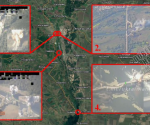Secret Casualties of World War II: The other 9/11 (or, Shelling Londoners like Germans on the Somme could only have been about killing them)
The day of the anniversary marking 20 years after 9/11 is not only notorious because of the deaths of hundreds of civilians in the controlled demolition of buildings in the World Trade Centre complex in New York City. It was also the day, 81 years ago, when the British Army started shelling London as if it were a German position on the Somme. While there are natural comparisons to make between the “Covid-19” fake pandemic and 9/11 as far as the manufacturing of an appearance of a crisis is involved, it is probably more useful to notice a similarity between World War II and the ongoing economic blockade in the name of a public health emergency. What has happened in 2020/21 is the balancing of “economic inductance” (as discussed in “Silent Weapons For Quiet Wars”; Part One: “Inductance” For Economic Dominance) with democide just as might happen in a war. Indeed, the reason why we’ve seen “Covid-19” rather than a war in our generation is because the Anglo-globalists out of London would have lost it – and more importantly, themselves.
That the real and meaningful comparison to be made is with the conditions in Britain in World War II is partly why there has, at this time at FBEL, been so much material looking at how UK Government killed its own citizens during the Second World War, with one reason for doing it being to present the survivors with an impression of being in a desperate war whereby there could be forced scarcity and privations (or, the shrinkage of the store of “capital energy” in the economy-as-electric-circuit model) blamed on the inconvenience of war. As Orwell spills the beans, only the “Inner Party” was not poor in World War II.
At the moment, we are looking at Simon Webb’s book, Secret Casualties of World War II, and so that we fortunate few who write and read FBEL can consolidate the knowledge gained from our previous look at our object of study, this follow-up re-treads the same ground. For those of you who have a copy of the book, this piece is based on a reading of Chapter 5: The Blitz, 1940-41, whereas the previous submission was enabled by the first four divisions of the book.
So, imagine, reader, Britain coming into the summer of 1940. Germany will soon conquer France and set up puppets in Vichy and elsewhere in the former French empire. It means that the war to defend Poland is about to be lost. In fact, on June 4th, the last day of the evacuation at Dunkirk (with the Germans allowing the British Expeditionary Force to leave with a view to having a peace), the war to defend Poland was already over. The German occupation of Paris was 10 days away, and Italy had not even joined the conflagration. They would join, it seems, in time to carve France up, but they didn’t threaten territory occupied by British forces until September and the attack on Egypt. This, by the way, was an act that coincided, more or less, with “Black Saturday”: September 7th, the start of the Blitz, when the Germans changed their attitude and approach to Britain and the kid gloves came off, and – we can have a very good guess without looking for it in a history book – no longer thought there was a peace to be had that Italy might spoil as it proceeded with its own plans.
In that previous year through ’39 and ’40 when Germany thought that peace could be had with Britain, for half the time, there had been no major contact between the two powers, and for two months after that, there was some musical chairs in Norway, when the British invasion of that country was checked by German occupation. The fact is that the UK Government’s Norway misadventure always comes across as an attempt to take advantage of Germany’s reluctance to engage with British forces: it’s talked about in terms of denying resources to Germany, as if she wouldn’t take the country militarily if Britain occupied it first. We don’t hear about the extraction of British forces from Norway (happening at about the same time at the French counterpart) like we do about Dunkirk, giving us the impression that the Germans were less interested in destroying the enemy army in the field in Norway than it was in France. The casual exchange of Norway is another clue that gives the game away: the UK Government, now fronted by the fat ration-gobbler Churchill because of his gift of the gab (and, perhaps, his career for decision-making, unfettered by scruple, that lead to large amounts of unnecessary death), knew that Germany didn’t want to fight.
In June of 1940, then, direct and indirect British efforts to win the war to defend Poland had failed. The war was over. What turned the German-Polish War of 1939-40 into a World War was the continuation of Britain as a combatant. Needless to say, the eternal question that Britons need to pose for ever more to the continuity UK Government (meaning that the same totalitarian form rules now as it did then) is why would it ever do such a thing?
Well, we know the reason. It’s because Germany did not get bogged down in war in Poland, which might even have drawn in other Eastern European and Balkan countries scrapping over disputed territory, whereby she could arrive – not before creating a market for British arms sales (on the slate, of course) – at a weakened state, much to Britain’s liking – all as revealed in H.G. Wells’ war-gaming, thinly disguised as fiction (see the FBEL article, In Which We Observe H G Wells Agitating For A New World Order In 1940).
Of course, things turned out very differently to the war that the British engineered by giving guarantees to an emboldened Poland – in fact, so intolerable was the outcome that UK Government could not leave the situation as it had created it. The only hope of recovering was by drafting the United States into service. As this was a long ways off in 1940, something had to be done about creating the appearance of being at war against an enemy who didn’t want to fight – otherwise, who knows what inconvenient clamour for peace might be had by the British population.
Even when the Luftwaffe had been provoked into the Battle of Britain, its attacks primarily on Royal Air Force targets (as defence against the RAF’s provocations) didn’t cut the mustard – as a Wikipedia entry says “civilian attitudes in Britain to their German foes were still not intense as they were to becomes after the Blitz” – and it looks like UK Government got a lucky break when German patience finally ran out, and the focus of the Luftwaffe’s Trenchard doctrine-esque approach (the Germans will no doubt have had their own name for it) was modified so that the London docks – and along with them, the residential East End – were to be targets for bombing. The reason for the switch appears to remain a mystery, but maybe it’s as simple as the RAF threat having been considered dealt with for now†; after all, Webb reminds us that, at the start of September 1940, “just a little more effort on the part of the Germans might have finished the RAF as a fighting force” ‡.
Webb calls the Blitz “sudden and wholly unexpected”, just as if the Germans really had been pussy-footing around until then. It certainly makes a complete mockery of the idea that Britain was victorious in a “Battle of Britain” – a conflict that was in fact mostly an illusion – so that the Germans had to leave off mixing it with the RAF, and start bombing civilians in the night time. Indeed, the same can be said about the whole campaign from July 1940 to May 1941. As has been pointed out hereabouts before, German airplane losses were not disastrously different from the British – it’s just, or so it must appear to any reasonable man or woman, that the naval war in the Atlantic was a better prospect for creating a siege of Britain. The Germans left off bombing Britain so intensively because there were other options. Nevertheless, this allowed the dishonest UK Government to claim a famous victory.
Also, UK Government had achieved the goal of creating a situation where the British people could really believe that they were in a war. Moreover, UK Government had created a brutalised people who wanted to be in a war.
And this leads us to the other question that Britons needs to perennially pose of the continuity UK Government on behalf of the ghosts of their ancestors: why, if they were deemed so useless by anyone who knew anything about them, were anti-aircraft guns used against the Luftwaffe, not just in the 1940-41 campaign, but all the while through the remainder of the war while the Germans were able to mount manned air raids (as opposed to sending rockets)?
How many shells of the tens of thousands that were fired by the British Army each week – certainly for the duration of the Blitz, and not only at London – only to land and explode on the ground, or to explode harmlessly in the air to create a rain of red-hot shrapnel, is something that appears to be incalculable and unknowable, but after the war, the man in charge of the anti-aircraft guns, General Pile, admitted that in September 1940, 20,000 shells would have to be fired to down one bomber (p64). Even Winston Churchill knew that the anti-aircraft guns were “instruments of self-bombardment” (p64). Why would UK Government even begin to think that the deployment of anti-aircraft batteries was a good idea?
Of course, the answer being sought has already been found – but let us first look at the official excuse, which Simon Webb, being basically conventional, doesn’t question.
For the first few days of the Blitz, anti-aircraft crew had to follow strict protocol not to fire into an area of sky where the RAF was engaging the enemy. These days were the Saturday 7th to Tuesday 10th. Apparently, in this short time, the likes of Westminster Abbey cannon, F.R. Barry, detected an air of rebellion amongst East Enders, and “made it his business to contact the Prime Minister directly… and telling him that, ‘if this were allowed to go on there would be anti-war demonstrations which the government would not be able to contain’” (p62). The problem, officially speaking, was a loss in morale leading to refusal to participate.
Supposedly, then, this led to the decision to withdraw the fighter defence during the air raids, and give the guns free rein:
At a meeting on Tuesday evening, General Pile announced that from the following day, every gun was to fire continuously, without worrying about aiming at any target. (p65)
We learn the effect from Webb’s citing of a direct quotation from Churchill’s written account, and from other sources:
“This roaring cannonade did not do much harm to the enemy, but gave enormous satisfaction to the population. Everyone was cheered by the feeling that we were hitting back…” (p68)
…“Barbara Nixon, who was an air-raid warden, wrote that, ‘on Wednesday they brought up the guns at last. There never was such an exhilarating uproar… It was a splendid and deafening cacophony’. The next day’s Daily Express, hit the nail on the head when they described ‘gunfire louder than bombs’” (p69/70).
We are supposed to understand, then, that the noise of a barrage – effectively being rained down upon London – boosted the morale of Londoners.
Naturally, the author has several problems with this cover story. First of all, we cannot help but notice that the idea of morale being lifted is given to us from the war-time leadership, a person with a vested interest in the significance of Air Raid Precautions, and corporate-media, with concern about how the hoi-polloi might react apparently being gauged by a handwringing Westminster Abbey cannon – or the useful idiot social issue lobbyist. All this should make us suspicious of a top-down propaganda campaign (especially if we understand Orwell’s account of the proletariat to be a realistic reflection of the UK Government’s feeling of threat from the East End dock worker, or any other Briton who wasn’t an official or a bureaucrat). And when one reads the following, one can only think that the staged encounter between people and politician for furtherance of agenda is not a modern invention:
Winston Churchill visited some of the bombed areas and was enthusiastically received. Witnesses agreed that he had been greeted with cries of, ‘we can take it, but give it ‘em back!’ (p62).
On consideration of this matter, the author now believes it is more likely that UK Government was worried about abandonment of war work rather than protest and worse. However, he imagines that absconding into the countryside could have been prevented by simple travel restrictions (he hasn’t checked to see if people were generally sanctioned by such things Ɨ), but more importantly, by the promotion of the busy-bodying and overly officious from the local population into civil defence units to act like a lynch pin tying a community, which they would superintend, to the place where it lived.
In short, the author doesn’t believe the story about maintaining morale, because UK Government had ways, and indeed employed them, to ensure that the dozy Briton would be fatalistic and just “take it” – with the least of these ways, of course, being told how to think by the Daily Express. Speaking of which, one of the reasons that the film, Things to Come≠, of 1936, showed a mobile anti-ship gun being parked in a town centre and firing off a barrage of shells while temple-faced architecture fell down to the ground around it was to prepare Britons with an association between air raids and an anti-aircraft response – plus all the collateral damage. It was expectation management.
It is no wonder, then, that after such preparation, a know-nothing-know-it-all (the sort of which Britain is so excellent at producing) – meaning F.R. Barry – would grow concerned that for three days there had been air raids without a ground response, as per the conditioning. You see, reader, UK Government was very cunning in denying satisfaction for a faction of people, or a type who would have been inculcated with an expectation for the use of anti-aircraft artillery, because the denial would create anxiety, and out of the anxiousness would could an impression of demand.
Again, the author cannot see why, at a time when people were being told how to live their lives in minute detail according to the dictate of an “unavoidable” war, UK Government could not explain the futility and danger of anti-aircraft weaponry. Moreover, if conditioning for the eventually of large scale bombing had been happening since 1936, at least, it means there had also been plenty of time for a programme of teaching whereby people understood that the best thing to do was to wait an air raid out, combined with the practical effort of effective air raid shelter construction. That there was a woeful inadequacy of the latter come the day when the Luftwaffe’s bombs started to fall on residential areas around the London docks is a tangible clue that UK Government had no real concern for maintaining civilian morale, let alone protecting its life.
It follows, then, that the conditions were entirely favourable for UK Government, when the requirement for it arose, to draw the Germans into a campaign of terror that could be augmented by shell fire from the British Army entirely for the purpose of brutalising the British people, and having them become interested in staying in the fight. Indeed, if we look at things from the perspective of a reality where UK Government was actively trying to kill British civilians, the apparent impetus for shelling from the ground, in the name of maintaining morale, gave UK Government a pretext to withdraw a civilian’s best hope of defence (other than the generally missing air shelter), the night fighting planes (even though there were but few).
† War-time assessment by the British claimed that the RAF always remained a competent force – but then this is not a surprise if UK Government wants to claim victory in a “Battle of Britain”. Wikipedia cites post-war historians who think that the Germans did indeed refocus at a critical time for the RAF; the following is an example:
While its reserves during the Battle of Britain never declined to a half dozen planes as some later claimed, Richards describes 24 August to 6 September as the critical period because during these two weeks Germany destroyed far more aircraft through its attacks on 11 Group’s southeast bases than Britain was producing. Three more weeks of such a pace would indeed have exhausted aircraft reserves.
[Update, 14.10.21: As for the reason why Germany took its foot of the RAF’s neck, Britain bombed Berlin for the first time on 25th August, 1940, and this is supposed to have provoked Hitler. Moreover, court history also tells of an accidental German raid that hit civilian areas in London, and with this triggering the Berlin attack, the slide into bombing civilians was a sort of tragic mistake. However, the truth is that the RAF had been making provocative attacks for months, and the Luftwaffe had also been having previous collateral damage incidents. The attack on Berlin could have been a final straw for the Germans, or it could have occurred at a time of shift in strategy that was going to happen anyway. The only thing that the bombing of Berlin at this time might tell us about is the desperation of UK Government to have the Luftwaffe change its approach.]
‡ The “Battle of Britain(.co.uk)” website has published a daily record of events, which it calls a diary, and this is the entry for 11th September, 1940 (11/9/40 – or 9/11/40):
Night: Night bombing was spread over much wider area, due to doubling of London anti-aircraft defences. Other bombers attack Liverpool.
Ɨ It would be a surprise if people were not restricted from travelling – take a look at the crimes that one could now commit under the Party rule (from the BBC News’ Breaking the law during World War Two – link):
An engine tester in Coventry was sentenced to three months’ hard labour in 1943 after taking 10 days off without permission when he got married…
In Hebburn, South Tyneside, a 20-year-old apprentice driller irked magistrates in 1942 after he was late for work 33 times in 41 days. He was charged under the Essential Work Order…
Elsewhere a farmer near Darlington was fined more than £1,000 in 1942 after failing to grow two acres of potatoes, as ordered by the minister of agriculture.
≠ See, Lessons From Nineteen Eighty Four: A Prelude To A Series On The Deliberate Wartime Shelling Of British Civilians – link.


















